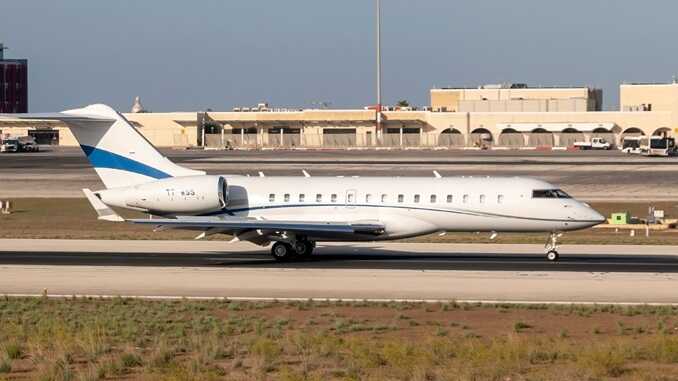Al-Organi is also the chairman of the Organi Group, a sprawling network of companies in real estate development and security. It includes the construction firm Misr Sinai, which al-Organi said in a 2014 interview was 51-percent owned by the Egyptian armed forces.
Another interesting al-Organi company is a travel agency called Hala Consulting and Tourism, which has allegedly been charging Palestinians eager to flee Gaza up to US$4,500 for a quick and hassle-free trip to Cairo, including a permit to enter Egypt.
Now his name has popped up in the Zambian case, which began unfolding almost a year ago.
Acting on a tip, Zambian authorities raided and seized a private jet a day after it landed in the country on August 13 last year, and arrested 10 people. They confiscated $5.7 million in cash, five guns, and 127 kilograms of what appeared to be gold bars.
The plane had flown the previous day from Cairo to the international airport outside Zambia’s capital, Lusaka. But the aircraft’s owner remained unknown –– until now.
Journalists reporting on the case for OCCRP and Sky News have acquired legal affidavits showing the plane belongs to al-Organi.
Among al-Organi’s interests is World Aviation Sinai International Mountain Limited, which owns the plane, according to an affidavit he submitted in December to Zambia’s High Court in a bid to regain possession of the aircraft.
The tycoon stated that he was the “sole director” of the firm, and the “owner” of the Global Express T7-WSS jet.
OCCRP emailed questions to al-Organi’s lawyers in Zambia, and spoke on the phone to a director in Organi Group, but none of them provided comments.
Al-Organi stated in his affidavit that Ibis Air (PTY) Limited managed the plane on his behalf. He told the court that neither he nor the management company had any connection with the Egyptians who chartered the flight from Cairo to Lusaka.
The director of Ibis Air, Baher Fawzi Mohamed Aldamasy –– an Egyptian residing in South Africa –– also submitted an affidavit challenging the Zambian state’s seizure of the jet.
Aldamasy stated that neither the jet’s owner nor Ibis Air was required to investigate a client’s work history or activities beyond what was necessary to determine rates, ensure the jet’s safety, and comply with International Civil Aviation Organization standards.
In April, Zambia released the jet, following an agreement between World Aviation Sinai International Mountains Limited and the Director of Public Prosecutions, said an official with the legal office. It had been seized under Zambia’s forfeiture of proceeds of crime act, he said in a phone interview, adding that the case was now concluded.
“When we enter a consent judgment it means we are satisfied,” said the official on condition of anonymity, because the wider case is ongoing.
But authorities have not publicly named the jet’s owner, which has been the subject of speculation since the raid by Zambia’s Drug Enforcement Commission (DEC) almost a year ago.
That was just one of many questions surrounding the ongoing case. Also unclear were the roles of five Egyptians who were arrested in Zambia, but later released after charges were dropped.
In an affidavit, one of the Egyptians onboard said he thought they were engaged in a legal gold deal. But the court has yet to clarify some strange circumstances of the case, including allegations of bribes and the presence of weapons and ammunition on the plane.
Another mystery is how a Zambian man charged in the case was reportedly able to get through airport security with 602 pieces of apparent gold, and bring them onto the aircraft. Zambian authorities later conducted tests on the metal, and discovered the bars were mostly made of copper and zinc.
“This has been a clear case of scamming, gold scamming,” said DEC Director Nason Banda at a news conference after the operation.
Five Zambians are reportedly being tried in the Lusaka High Court on espionage charges, because they entered a forbidden part of the airport. The next hearing, according to the Public Prosecutions official, will take place in August.



































